They Don’t Love You Like I Love You: Karen O, crushing hard
Eight years ago, with Yeah Yeah Yeahs at the height of their powers, Karen O documented her romantic obsessions on a basic tape machine in her New York apartment and a number of hotel rooms
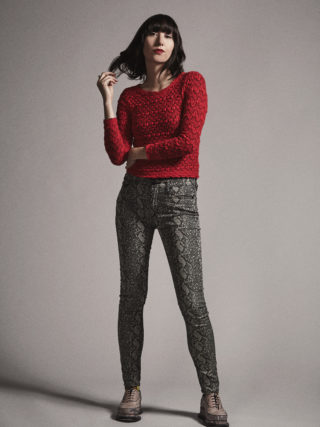
Eight years ago, with Yeah Yeah Yeahs at the height of their powers, Karen O documented her romantic obsessions on a basic tape machine in her New York apartment and a number of hotel rooms
Twenty-seven, in case you haven’t heard, is an important year for rock stars. It’s when they die. Or, in Karen O’s conveniently symmetrical case, when they “live how you’re supposed to live.”
For O (born Karen Lee Orzolek to a Korean mother and Polish father), this golden year fell between 2006 and 2007, and it was then that she wrote and recorded ‘Crush Songs’, a collection of home demos that would become her debut solo album some eight years later, released September 2014 via Julian Casablancas’ Cult Records.
I briefly met O in the summer of ’06, as a wide-eye intern at Reading Festival. I was arranging a photo shoot with Yeah Yeah Yeahs and three teenage fans who’d won a competition to introduce the band on the main stage that evening. I remember that O appeared more bashful than the starstruck kids – not what I was expecting after three years of watching her screech across stages in wrecked Chuck Taylors and tattered mini skirts, pumping sweat and posturing with a devilish grin of smeared lipstick, her glittery eye shadow smudged and on the move across her face. Of course, she did all of that come show time, dressed partly as an emerald green dragon in purple leggings, with flames burning up her Cons.
I can’t imagine there’ll be much of that tonight, at O’s second and final London show in support of ‘Crush Songs’. It’s been an understated tour for what she calls “a small, little record”, in venues her band outgrew even before their debut album was released in 2003.
Demure in a ball gown and uncharacteristically still, O has spent the last couple of weeks watching people make out to her songs; her threadbare, scratchy almost-songs, preserved in their newborn state by an eavesdropping tape machine.
‘Crush Songs’ is a deeply personal record, from its subject matter (real life infatuations with four boys of note, including the man O would go on to marry in 2011) to its pimply, unprocessed presentation and lone acoustic guitar. Some of the tracks were pretty much written as she sings them; most refuse to repeat themselves like conventional pop songs do. Just as they get going, they fade to nothing. They are without flesh and skin, because they were never intended to be heard by anyone else, just as a diary writer doesn’t make pretty letters that live under the bed.
It’s hardly the record that anyone was expecting from the new millennium’s Iggy Pop, and accordingly it’s left some fans frustrated. Part of that stems from what we consider Karen O to be, versus the shy, unassuming woman who arrives at our photo shoot completely alone and suspiciously punctual. But it’s also down to the unfulfilled potential of some of these songs. ‘Visits’, ‘Day Go By’, ‘Native Korean Rock’ and the particularly faint, closing ‘Singalong’ all feature melodies that are beautiful but fleeting. Presumably, a track like ‘Maps’ started out in a similar way, and look how well that turned out once it was given a good meal.
“Yes, totally. I was going back and forth, vacillating on that,” she says when I ask if taking these old demos into a studio to rerecord them had ever crossed her mind. “But I feel like my intentions for putting them out more produced were just not pure. They were things like, ‘because it would be more accessible,’ or, ‘because more people would enjoy it’, it wasn’t like, ‘because it’ll sound so much better’ – it was more like thinking about it from a commercial standpoint, and it’s like, fuck that, y’know? So I’d think about it but always ping-pong back to, ‘ah, fuck it’.”
Karen says she asked a few friends what they thought, including Dave Pajo, Slint guitarist and a touring member of Yeah Yeah Yeahs since 2009. In February of the same year that Pajo joined the band he released a lo-fi album of Misfits covers played on an acoustic guitar. ‘Scream With Me’ left an impression on O, who admired the record’s simple beauty and good humour. Once it was her turn to potentially release something even more skeletal, Pajo was a strong supporter of leaving the tracks well alone.
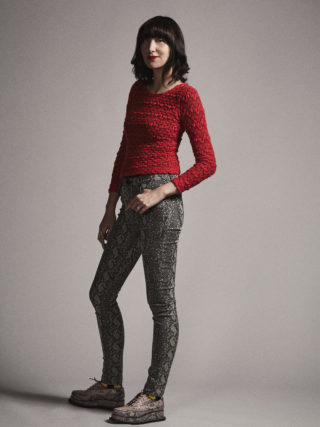
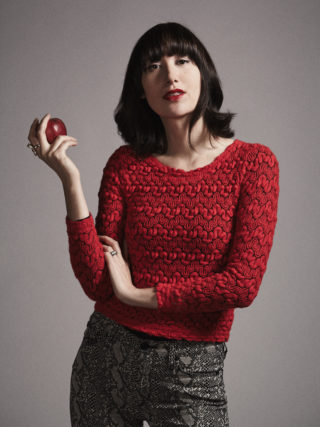
“Beyond all of that, you just don’t get this kind of stuff,” says O, sat on the roof of West London ballroom, Bush Hall. “These songs, it wasn’t me trying to write a song; it was me working through emotions and feelings and love shit and life. And a lot of them, what you’re hearing is the first time I’m even putting it down. It’s so raw and authentic, and there’s a primacy to them that I don’t feel that you hear so much. It’s not a common thing, and when I listen to them now they transport me back to those moments, and I felt like there’s nothing that I can reproduce in a studio that can give me that same feeling.”
“A lot of things get lost in translation with Yeah Yeah Yeahs,” she says. “Demo love, y’know, it’s a real thing, and a lot of people are stricken with it. We do demos and I don’t know if we ever capture the same feel and essence of the demo in the produced version, but, y’know, we can’t really put out a bunch of demos. So this was refreshing, to be able to do that.”
But there are moments on ‘Crush Songs’ that you want a little more of; there are melodies, in particular, that you want to hear more than once.
“But that’s the other cool thing about it,” she insists. “They’re like… what’s the word…? fuck… They’re kind of like haikus or something, because it’s kinda nice that they’re so short and that I haven’t embellished them, because really, in the end, you don’t need any more than is there, because I think I’ve got the point across. I’m not a waffler – writing lyrics is like getting blood out of a stone for me, so once I get it, [clicks fingers] there it is. That’s actually harder to do than jam out for a while, for a lot of people, but for me, it’s generally my style to keep it as simple and pure and to the point.
“I think a lot of people were thinking it was going to be a banging dance-pop record, because that’s what a lot of gals do when they break off and do their solo thing, but I wanted to make it clear that it was this lo-fi, small, personal, quiet record. I think I got that across alright, but that was important, because there’s always expectations. I didn’t feel that the world needed another dance-pop Karen O record – that’s the last thing the world needs, actually.”
Karen says that she doesn’t consider ‘Crush Songs’ to be her debut album, “because I wrote it when I was very much ensconced in Yeah Yeah Yeahs, and I never actually intended on releasing these songs in the future.” Perhaps that makes it all the more perfect as a solo debut. After all, when musicians step away from the bands they’ve made their careers in, isn’t it to set straight all those assumptions we’ve made about them over the years? Isn’t it to prove that they are people, too, rather than a percentage of a whole that moves as one? It’s not to say that Karen O isn’t the high-kicking, maniacal whirling dervish that flamboyantly careers around the stage with Yeah Yeah Yeahs – in part, at least – but the sweet, naïve Karen O that whispers on ‘Crush Songs’ is surely closer to how she exists day to day, even eight years on. That’s certainly how it seems on meeting her, from her nervous laughter that peppers the conversation when reassuring ‘y’know?’s don’t, and the occasional randomly placed ‘fuck’ – a reminder that she is still the woman who screams “as a fuck son, you sucked” on ‘Bang’.
“The ‘fearless’ performer, on stage with Yeah Yeah Yeahs, it doesn’t come naturally to me at all,” she says. “I’m very shy and I have lots of social anxiety [laughs] so I’m like one of those performers – there’s a lot of us.
“The first time that that ‘character’ came out was on the dance floor, probably. When I was living in New York in my early twenties there was a mod dance night, like a soul revival night, and I started getting drunk and sliding across the floor on my knees and tearing up the dance floor, and that’s when that started coming out. But the first Yeah Yeah Yeahs show, I was really nervous and I had about four margaritas before I went up there. I was wearing white pants, a white wife-beater and I cut these black duct tape heart pasties to put on my nipples, and then I doused myself in olive oil because I wanted to look sweaty, because whenever you see live rock photos of the legends, like Iggy or whatever, they’re just drenched in glistening sweat. I wanted to go on like that, even though it was, like, seven in the evening. So I covered myself in olive oil and it was stinging my eyes up there, and it just kind of came out. There was some dutch courage going on, but you can’t make that stuff up.”
And then that set you up to get up there again without all the margaritas and olive oil?
“Oh no. I mean, I only did the olive oil once [laughs], but it was then spiralling down and out of control; a continuation of drinking and stage antics for about 2 years, until I fell off the stage in Sydney, and that changed everything. That really sucked by the way – I mean, it was horrible. It was a nightmare.”
On 9 October 2003, at The Metro Theatre, Sydney, Australia, halfway through Yeah Yeah Yeahs’ fourth song, Karen fell off the front of the stage and into the photo pit. She made it back on to the stage to finish the number, and then gave ‘Maps’ a go whilst holding an icepack on her head. Then she conceded the inevitable. “I’m off to hospital,” she told the audience.
“I just stopped being an idiot [after that]. It was a warning,” she says. “The fact that I didn’t break my back or my neck was a pretty big deal. Or that my head didn’t get crushed because a monitor fell on my head.
“I was terrified to get back onstage after that, and I had to get on stage two days later [famously, she was pushed on stage in a wheelchair by her then boyfriend Angus Andrew of punk band Liars]. But I realised that the drinking was a crutch and that there’s ways to command an audience where it’s not coming from the alcohol, it’s coming from within me, and I’m still learning about that.”
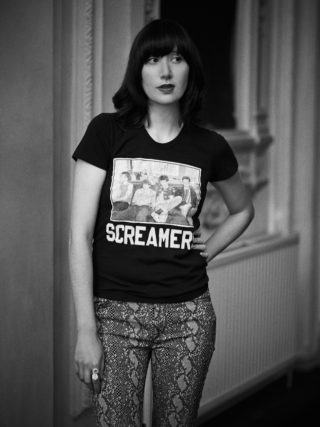
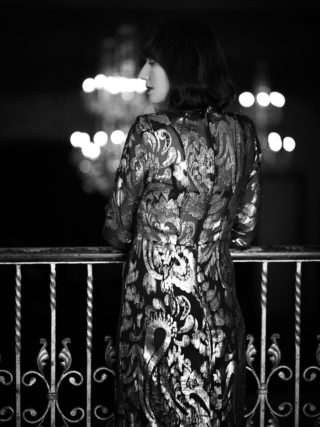
Born in Busan, South Korea, Karen Lee Orzolek grew up in Englewood, New Jersey, spending her formative years at a private school where she didn’t fit in.
She got into punk bands via a childhood friend and her peers from a neighbouring public school, but it was Neil Young that made the greatest impression.
“I remember being really struck by how odd his voice sounded,” she says, “high pitched and nasally but his songs were so beautiful, and it struck me that if he can sing, okay… It put that seed in my head. And then someone turned me on to Neutral Milk Hotel and ‘On Avery Island’, and again, Jeff’s [Mangum] voice is pretty unconventional but it sounds like he’s singing his heart out. So I just tried singing along with him in my car in New Jersey when I was driving around and stuff. I just thought, I guess anyone can sing as long as they’re singing their heart out – I might be totally wrong about that, but that’s the idea I had in my head.” Karen pauses for a second. “So anyone can sing as long as they sing their heart out, Dutch courage, some olive oil and you’re a fucking rock star.” She laughs, extending a finger with each step on her three-point plan.
“My best friend from childhood took voice lessons her whole life,” she says. “I always thought that was weird.”
In 1998, O arrived in New York City, having transferred to NYU to study film. She’d followed a boy there, although that was as good a reason as any. “If you grow up a half hour drive from NYC there is always this reminder of greatness in art, culture and business that gets under the skin,” she says.
It was a town she quickly felt at home in, and would become synonymous with. NYU Film would leave its mark too, and Karen has never been far from the movies since, collaborating on soundtracks for House Of Wax in 2005 with Har Mar and Jackass 2 in 2006 with Peaches. Also to the silver screen she’s given cover versions of Roger Alan Wade’s ‘If You’re Gonna Be Dumb’, Bob Dylan’s ‘Highway 61 Revisited’ and Led Zeppelin’s ‘Immigrant Song’, for Jackass 3D, I’m Not There and The Girl With The Dragon Tattoo, respectively.
For a time, O dated Director Spike Jonze, who remains a close friend to this day – one that she has worked closely with on a number of projects. Most notable are the complete soundtrack to Jonze’s 2009 adaptation of Where The Wild Things Are and the more recent ‘The Moon Song’, from 2013’s Her.
Although (slightly) more produced, it’s ‘The Moon Song’ that resembles ‘Crush Songs’ the most, or vice versa – an unfussy, doe-eyed lullaby, joined only by a barely-there acoustic guitar and mooned (ahem) to itself, O’s voice cracking as it eeks out of the register of a whisper. It makes you realise just how filmic ‘Crush Songs’ is, even in its raw state.
‘The Moon Song’ was enough of a success that people really should not have been thrown by O’s non-disco-pop debut. It earned her an Oscar nomination in 2014. She performed the track at the awards ceremony.
“Somehow I managed to have a blast,” she says, “but my experience would have been very different if I hadn’t performed. It’s so fun and fascinating to be a part of the show. There should be a documentary on the local actors they hire to play the A-list actors in rehearsal, who give acceptance speeches in their place while they run through the show. That’s gotta be a head fuck… which is the theme for the night in general.”
The same year that Karen enrolled in college she took guitar lessons from a guy with a mullet called Rick. The first two songs she learned were by Neutral Milk Hotel and Mazzy Star. She met Nick Zinner in 2000, around the time she was writing “folky love songs”, which Zinner would dutifully play slide guitar over. Her first show was at an open mic night at Sidewalk Café on 6th Street and Avenue A.
By her early twenties she’d discovered PJ Harvey via the singer’s ‘4-Track Demos’ compilation, and would soon take her lead from the Brit’s visceral sexuality. As she told Pitchfork earlier this year: “I remember listening to [‘4-Track Demos’] and being like, ‘Whoa.’ She’s in her bedroom tearing open her insides, and her legs are wide open. I felt so voyeuristic listening to that record, more so than anything I’d ever listened to up until that point. It felt like I was up to no good, and it was an awesome feeling. Her stuff was unbridled, feral, really sexual. I listened to that record and thought, ‘Wow, just think of what you can do if you access those parts of you as an artist.’”
Karen admits to having been “boy crazy” up until the moment she married British video Director Barney Clay in 2011. “I’ve crushed hard my entire life,” she tells me, but insists that 27 proved a particularly susceptible year.
“It was a golden time for me. I was single,” she says, and pauses. “Sorry, it always goes back to love with me. I just felt really free. It was a weird year, where I just felt like I had this new lease of life. I was extra adventurous that year, and I was trying everything out and I was trying all of these people out, too, and I just had this confidence. And all the while I was searching for someone… Sorry,” she says again, “I’ve always been very love-centric and love obsessed, so it was a huge distraction until I found someone. Nowadays, not so much, but at that time we’d just come off of touring our second record [‘Show Your Bones’], and the touring for that was really cathartic because the making of the record was so traumatic [a rift between O and guitarist Nick Zinner reportedly fractured a band with two opposing figureheads]. There were all these factors that made me feel really open to love and life. I was just going for it, living how you’re supposed to live.”
I tell Karen that I’m surprised to hear her say what a positive time it was – much of ‘Crush Songs’ has it down differently. “Love’s a fucking bitch / Do I really need another habit like you? / I really need / Do you need me too? / I believe it’s gonna leave me blue,” she laments on ‘Rapt’. ‘NYC Baby’, meanwhile, pines for a love stuck at home while O faces a life on the road alone; ‘Body’ features the aching lines: “If you love somebody, anybody / There will always be someone else / So make it right for yourself.” I could go on.
“But that dark shit is as good as light shit,” she says, spoken like a seasoned pro in crushing hard. Of course, she’s right – that’s what makes a crush a crush: the impending sense of doom paired with the total abandonment of reason and logic. For any crush to be virtuous and true, the odds need to be stacked against you, otherwise you’re not trying hard enough; otherwise you’re not completely out of your mind. Crushes, in their very nature, are superficial and unattainable. They are fuelled by lust and fantasy and risk and injustice, and in that sense aren’t a majority of pop songs crush songs, rather than love songs, from Katy Perry to ‘I Want To Hold Your Hand’?
“I was thinking about that because I figured someone would ask me about it. In many ways there’s not a huge difference – a crush song and a love song are the same – yet I feel like with crush songs, it’s just the beginning of love, the early stage where it’s all fantasy and it’s all projection and melodrama – all the fucking best stuff is the crush, y’know? And even the heartbreak and the unrequited aspects, y’know, it’s good. And then love songs are, I feel, a bit of a different animal – similar, but a little further down the line. The crush is all feelings that come rushing in; the fantasy of what could be or what never was.
“When you fall in love, you’ve got so much to gain but you also have to kill off some stuff too,” continues O. “You have to murder parts of your heart too, y’know? Because I think that every love that you ever have always stays with you, but you can’t have too much of that lingering around in order to make space for this new thing and to commit to being with ‘the one’. So there has to be loss as well, so there’s mourning and there’s grief for what you have to lose to gain. So a lot of these songs are working through that – there’s loves that had to go in order for a new love to come, and y’know, there’s a lot of mixed emotions with it.”
It’s one thing to reminisce about an old flame to oneself, though, and another to broadcast your eight-year-old love letters to the world. Is it not strange, revisiting these crushes that you sobered up from so long ago?
Karen laughs her hardest yet. “No, it’s not strange, because it’s so fucking romantic! Being married is not as romantic as heartbreak, and the adolescence of love is obviously more romantic than the maturity of love, so it’s nice to revisit those feelings of your adolescence.”
Can I take that to mean that you’re a nostalgic person?
“Not so much, y’know. I’m like more of a future person. I don’t get too stuck in the past, but it’s so awesome to have those feelings well up inside of you again. It’s a good drug.
“Being nostalgic is a problem because it means you’re not living in the present – you’ve got to create new memories, right? – but for me I miss the here and now by thinking, ah shit, what’s next?”